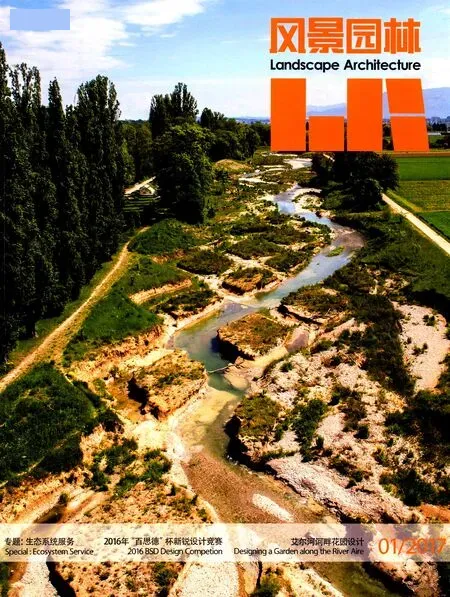生态系统服务
2017-05-12王向荣,WANGQian
刊首语
生态系统服务

记得20世纪80—90年代的校园,夏季时白色的蝴蝶不时飞舞过操场,蜻蜓在空中盘旋,傍晚燕子在家属区低飞,时而还能听到蛙声,看到蝙蝠和发着蓝光的萤火虫。可是现在这种景象都已消失,在北京我已经许多年没有再见到蝴蝶飞舞和蜻蜓盘旋的景象了。
上面提到的这些小生物都是人类的朋友,也是自然生态链中不可或缺的重要环节。如果没有蝴蝶,世界上就少了一支庞大的授粉大军,植物的繁衍就会受到影响;如果没有蜻蜓、燕子、青蛙和蝙蝠,蚊蝇等害虫就没有了天敌。伴随着一些物种的减少或消失,它们所提供的生态服务也会随之减弱或消失。
仅仅从指标上来看,这些年来中国城市的绿地面积和绿地率并没有减少,甚至还有不同程度的增加。比如我们学校东面不远处新建了近7km2的森林公园,北面紧邻学校又建了1 km2的郊野公园,绿地大大增加了,然而为什么人们反而看不到蝴蝶和蜻蜓等物种呢?
麦克哈格曾说“城市中重要的系统有两个,一个是自然的系统,一个是人工的系统,一个好的城市中这两个系统是互相平衡的。自然的系统并非指绿色的自然,而是能够真正按照自己的演变进程发展的自然”。这样的自然实际上是城市中以自然而非人为主导的土地,植被遵循自然演替的规律而发展,各种植物相互竞争、逐步适应,从而构成适宜当地环境的群落,并形成稳定和优越的生态系统。这片自然中的主人是土地本身和其上自由栖息的生命,在维持和改善城市生态环境方面,这样的自然较之那些精心设计和建造,靠高强度人工管理来维护的绿地更具有优越性,因为人工管控下的城市绿化,植物按照人的要求来选择,生长也受到人的控制,群落的自然特性相对薄弱,生态系统单一,自我构建和修复的能力已经萎缩,并不具备为当地一些物种提供栖息地的生态服务条件。
如此看来,蝴蝶和蜻蜓在城市中大幅减少的原因,并非由于城市中缺少绿地,而在于城市中能够真正按照自然的演变进程发展的土地和水域已基本消失,在近30年的快速城市化进程中,我们的城市生态环境已经发生了根本的变化。一方面是城市的快速拓张蚕食了城市中和城市外围的原野、树林、湖泽和丘陵;另一方面,城市中新建的绿地都是按照按人的使用、欣赏和审美来设计的,追求的是有装饰效果的、稳定的和可控的景观。由于这些绿色环境并不具备完整的生态系统服务能力,许多物种必然失去栖息的家园。
城市如此,整个地球也面临同样的窘境。近些年世界上用的最多的词汇之一就是“地球”,在地球上经历了百万年的进化后,人类已经十分适应这个环境,然而地球的生态功能正在恶化,森林在破坏,湿地在缩减,草地在退化、生物多样性在锐减、海平面在上升、水土流失和沙漠化的范围在扩大,人类对资源的消耗已经超过了地球的再生能力,地球的生态系统实际上是在赤字地运转。
几年前我曾给孩子买了本书《笔记大自然》(Keeping a Nature Journal),希望通过阅读这本书,他能够更好地观察自然和理解自然。书上前言中的一句话非常深刻:“人类追求辉煌和成功的梦想,最终将使得自身成为大自然的敌人。人类在挥霍自身智慧的同时,也在殆尽自己立足的家园。”经济的发展和科技的进步使得人类的自我意识不断膨胀,人类似乎具有了无穷的能力,可以按自己的意愿,任意改变环境。地球表面的陆地已有83%的土地被人类改造利用,这种改造都影响着地球的生态系统。当然有许多改造有利于生态系统的稳定和生态功能的提高,但是更多的改造在不同程度上都导致了生态功能的退化甚至丧失。
本期的专题是“生态系统服务”。生态系统的服务是非常全面和广泛的,比如为人类提供食物、原材料。生态系统可以调节气候、净化污染、涵养水源、保持水土、防风固沙、减轻灾害、保护生物多样性,进而为人类的生存与发展提供良好的环境。当然生态系统也为我们提供文化、精神、宗教、审美、休闲、旅游和教育等方面的服务。
生态系统为地球上所有的生命提供了赖以生存的各种条件,但是生态系统的维护与人对发展的追求之间往往又存在着矛盾。我们应该认识到,无论科技如何发展,世界怎样变化,人类与自然的关系也不会改变。路边最不起眼的野草或池塘中最低等级的微生物,也远比人类发明创造的任何装置要复杂和难解。生态系统的许多功能是人类科技不能提供的,也是金钱无法购买的。我们只有维系好人与自然之间共生互惠的关系,做到与自然和谐地相处,才能维护和建设好地球良性的生态系统。

主编:王向荣教授
2017年1月25日
Ecosystem Service
I remember what our campus was like back in the 80's and 90's of 20 century. White butterflies and dragonflies were dancing in the air, swallows were cruising low over the residential buildings, with frogs croaking, bats and glowing fireflies circling around. I have not seen butterflies and dragonflies for years.
They are our friends, and also essential to the functioning of ecosystem. Butterflies play a vital role in plant pollination and multiplying, dragonfly, swallow, frog and bat are natural enemies to mosquito and fly. With them gone, so is the provision of their ecological services.
Judging merely from the numbers, the percentage of public green spaces in cities of China are actually rising. Like the Olympic Forest Park east of the campus is 7 km2and the newly-built country park right north of the campus is 1 km2. How come we don’t see butterflies and dragonflies even with more green spaces?
Ian McHarg once identified that nature and built environment are two important systems in a city, and a good city owns a balance between these two. Here nature is a self-evolving system rather than simply the green spaces. It refers to urban land that regulated by nature instead of men. Plants grow under natural laws, while the competitive and adaptive ones eventually form adaptive local communities and reach ecosystem stability. Land and all living things on it rule this optimal system essentially. Compared to those high-maintenance greens that are carefully designed and built, natural system is much more preferred to sustain and improve urban ecology. Some natural attributes of plant community are weakened by artificial selection and human-regulated growth. Systems with reducing biodiversity no longer have the capacity of self-construction and restoration, lest to provide ecological services for some local species.
The diminishing of self-regulated land and water system, rather than the lack of green spaces, is the main reason butterflies and dragonflies are vanishing. Urban ecology has been drastically changed during the thirty year’s fast urbanization, which is encroaching rural lands, woods, lakes and hills. Meanwhile, urban green spaces are designed for people's amenity, aesthetic pleasure, pursuing decorative, stable and manageable characters. They are not capable of providing intact ecosystem services thus habitat loss is inevitable.
What urban cities are going through is reflective of the entire planet. PLANET is a buzzword in recent years. Human went through million years of evolution to adapt to and thrive on this planet. However, they are now facing ecological degradation with extensive deforestation, wetland shrinking, grassland degradation, biodiversity loss, sea level rising, water and soil erosion, even desertification. We are consuming nature's capital faster than it can regenerate and humanity has been running an ecological deficit with the earth.
I bought my kid a book called Keeping a Nature Journal a couple of years ago, hoping he could learn to better see and understand nature. In the preface it says that human’s desire for glory and success drove nature against us. We are destroying our habitat with our own hand. Money and technology make people think they are omnipotent and free to do anything to the environment. Many dramatic changes in the earth ecology are due to human influence, and human has taken up and transformed 83 percent of the total land surface. Some changes are favorable to the ecosystems stability and ecological functions improvement, but some are causing degradation and loss of certain ecological functions to some degree.
This issue will focus on ecosystem services. Besides provisioning food and resources, these services are comprehensive and wide, regularly involving climate regulation, pollution mediation, water conservation, windbreak and erosion control, disaster mitigation and biodiversity conservation, thus providing a better habitat for human survival and development. Moreover, ecosystem also offers us with cultural, spiritual, religious, aesthetic, leisure, tourism and educational services.
Ecosystem nourishes all living things on earth, but there’s a tradeoff between sustaining vital ecosystem services and pursuing economic development. It should be concerned that the relationship between human and nature will never change despite the development of science and technology. Even the humblest roadside weeds and inconspicuous microbes in a pond are far more complex than any man-made device. Functioning of the ecosystem cannot be replaced by artificial technologies or be purchased. A well-functioning ecosystem is only based on reciprocal and harmonious relationship between human and nature.
Translator: WANG Qian
Proofreader: WANG Xi-yue
Chief Editor: Prof. Wang Xiang-rong
January. 25th, 2017
